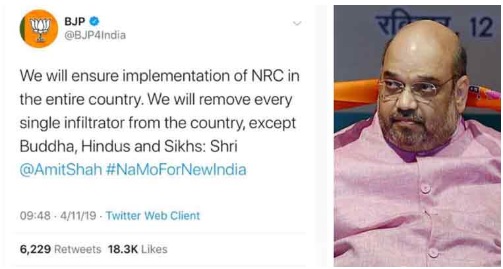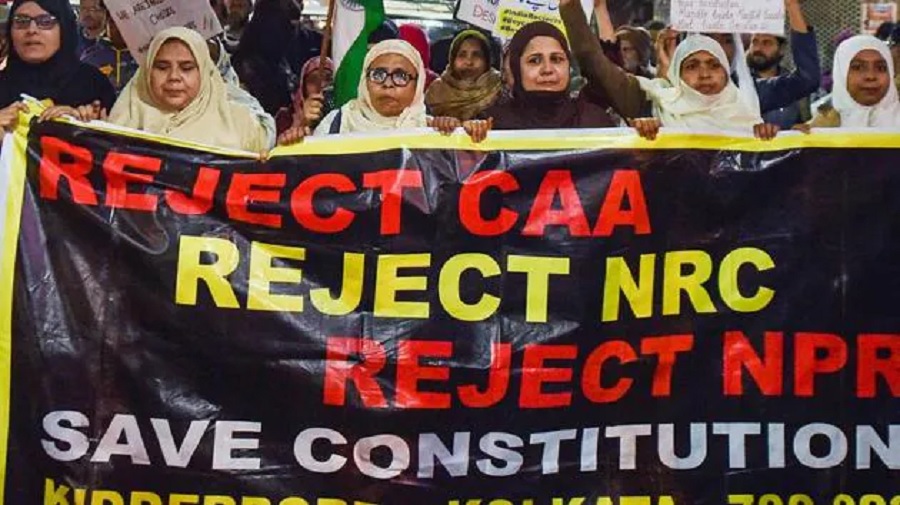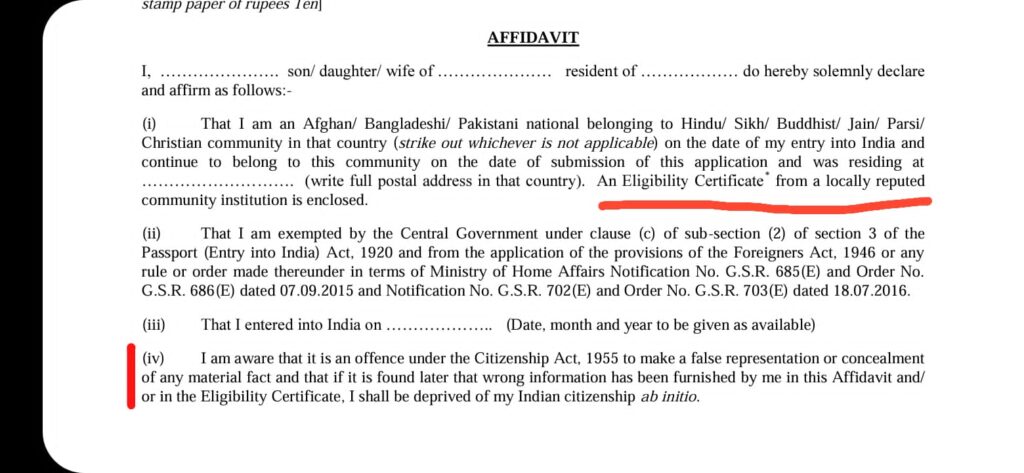On March 11, the Union government notified the Citizenship Amendment Act (2019) after four years and three months of continuously filing extensions. For months and weeks before this, the threat has been imminent and verbalised by the BJP’s top brass. In 2019-2020, prior to the pandemic, a controversial statement by the union home minister, Amit Shah in Parliament was ominous –he spoke of the chronology behind the CAA-NPR-NRC in Bengal and then in his infamous “Chronology samajhiye” speech. The CAA 2019 had been amended hastily on December 10 and 12 in the Lok Sabha and Rajya Sabha respectively.
What does the CAA 2019 do?
The CAA amends Section 2 of the Citizenship Act of 1955 which defines “illegal migrants”. Through the amendment, a new proviso to Section 2(1)(b) of the Citizenship Act. As per the same, persons belonging to Hindu, Sikh, Buddhist, Jain, Parsi or Christian communities from Afghanistan, Bangladesh or Pakistan, and who have been exempted by the Central government under the Passport (Entry into India) Act, 1920, or the Foreigners Act, 1946, shall not be treated as “illegal migrant”. Consequently, such persons shall be eligible to apply for citizenship under the 1955 Act.
However, in what is clearly violative of Articles 14, 15 and 21 of the Indian Constitution, the law specifically excludes the Muslim community from the proviso, triggering protests across the country and a slew of petitions before the Supreme Court. The Indian Union Muslim league and at least 149 others have challenged this amendment to the Citizenship Act, 1955. The petitioners challenging the law have submitted that the CAA discriminates against Muslims on the basis of religion. Such religious segregation is without any reasonable differentiation and violates right to quality under Article 14, it has been contended. On December 18, 2019, the apex court had issued notice to the Union of India on that challenge. However since the Rules had not then been framed, the union government had argued against any stay on the amended law.
IUML today challenges notification of CAA Rules
Bar & Bench reported that the Indian Union Muslim League (IUML) one of the Petitioners that had originally challenged the constitutionality of the Act in 2020 has now moved the Supeme Court (SC) to stay Citizenship (Amendment) Rules 2024. IUM: L, a Kerala-based political party, Indian Union Muslim League (IUML), has moved the Supreme Court seeking a stay on the implementation of Citizenship (Amendment) Rules, 2024.The IUML (petitioner), which was one of the first parties to challenge the CAA before the top court in 2019, has now approached the Court to stay the Rules. In 2019, the IUML had also pressed for a stay on the implementation of the Act. However, the Union government had told the Court then that since the rules had not been framed, the implementation of CAA would not take place.
With the Rules being notified on Monday, March 11, the IUML has now moved the Court seeking a stay on the Rules. IUML has also sought directions to refrain from taking action against persons belonging to Muslim community who have been deprived of the benefit to apply for citizenship under the Rules.
As per the application filed, the rules notified on March 11, create a highly truncated and fast-tracked process for grant of citizenship to persons covered under the exemption created by Section 2(1)(b) of the Act, which defines who will not be treated as an “illegal immigrant”. This, the plea states, is manifestly arbitrary and creates an unfair advantage in favour of a class of persons solely on the ground of their religious identity, which is impermissible under articles 14 and 15 of the Indian Constitution.
States protest
As soon as the much feared news broke, questions were raised over motive, intent. Anxiety prevailed especially for the Indian Muslim community but the Rajbanshis of Bengal and Adivasis and small farmers are no less anxious.
This article in Sabrangindia traces the bigotry behind the enactment.
The chief ministers of the governments of West Bengal, Tamil Nadu, Kerala released strong statements, not only expressing their condemnation of the CAA, but also asserting that the discriminatory Act would not be implemented in their states and would be contested.
Several commentators have criticised the move as one driven by cynical electoral politics, questioning why the Centre released the Rules at this moment after four years of delays, and condemning the exclusion of Muslims, Sri Lankan Tamils, and many others from the Rules’ criteria. Besides, concerns have been expressed, again, about the over 1,00,000 Afghani refugees whom India has given shelter due to persecution in their home country and similarly close to 40,000 Rohingyas who have fled Myanmaar. Sri Lankan Tamils too reside in many parts of Tamil Nadu and are likely to be (now or in future) be harassed by a vicarious bureaucracy over this amendment.
Since this ignominious amendment was passed, serious questions have been raised on how exactly the government would verify claims of religious persecution, what parameters would be used, and what digital security measures were in place to ensure that the personal data of applicants would remain safe from tampering.
All India Trinamool Congress (@AITCofficial) posted at 10:32 pm on Mon, Mar 11, 2024:
“If the CAA cancels anyone’s citizenship, we will not remain silent.” – Smt @MamataOfficial
“If the CAA cancels anyone’s citizenship, we will not remain silent.” – Smt @MamataOfficial
We await clarification on the new rules under CAA. Bengal will not tolerate any disturbance, and we will not allow this contentious law to deprive anyone. pic.twitter.com/7K423IX8pE
— All India Trinamool Congress (@AITCofficial) March 11, 2024
Chief Minister of Kerala, Pinarayi Vijayan released the following statement on twitter
The Central Government's notification of the Rules to the Citizenship Amendment Act in the wake of the elections is aimed at disquieting the nation. The Ministry of Home Affairs has issued the notification regarding the CAA, just ahead of the announcement of the elections to the…
— Pinarayi Vijayan (@pinarayivijayan) March 11, 2024
Chief Minister Tamil Nadu was clear and straightforward
Union BJP Government's divisive agenda has weaponised the Citizenship Act, turning it from a beacon of humanity to a tool of discrimination based on religion and race through the enactment of #CAA. By betraying Muslims and Sri Lankan Tamils, they sowed seeds of division.
Despite… pic.twitter.com/mbraX6SW10
— M.K.Stalin (@mkstalin) March 11, 2024
Other protests
Assam’s chief minister Himanta Biswa Sarma, has openly threatened that political parties faced the risk of deregistration if they organised anti-CAA protests, citing a ruling of the Gauhati high court in 2023 that declared bandhs as “illegal and unconstitutional”. Meanwhile reports of protests in in Kerala’s Kozhikode, compelled the police to go on a lathi charge. Besides, , late-night vigils were held by student organisations including Fraternity, MSF, and NSU(I) at Jamia Millia Islamia and Hyderabad Central University. The Quint reported protests breaking out against the notification of the Rules on the very same day across multiple districts in Assam. The Indian Express reported student unions burn copies of the CAA, and the opposition declaring a statewide ‘hartal’ on March 13.
A questionable process
A close look at the Rules themselves reveal that applications for the CAA are to be made via an online portal (indiancitizenshiponline.nic.in), on which applicants would be then issued with a digital certificate of registration or a digital certificate of naturalisation.
The Rules further confirm that only persons from Afghanistan, Bangladesh, and Pakistan who belong to Hindu, Sikh, Buddhist, Jain, Parsi, or Christian identities would be considered for citizenship under the Act. A person making an application through the CAA for citizenship would thus need to provide a minimum of five to six documents. These include:
- i) a filled application form;
- ii) one of the documents listed under Schedule IA of the Act, including but not limited to land or tenancy records from the origin country, birth certificates, identity documents, land or tenancy records;
iii) one of the documents from Schedule IB such as ration card, Aadhaar card, license, any letter issued by the Government or Court to the applicant with an official stamp, land or tenancy records, electricity papers, school leaving certificates, and others;
- iv) an affidavit verifying the correctness of statements made, as attested by a Notary/Oath Commissioner/Magistrate;
- v) a document providing evidence that an applicant or either of their parents was a citizen of Independent India (passport or birth certificate); and
- vi) if available, the copy of an expired Foreign Passport or Residential Permit
This completed application would then be processed by a District Level Committee, and then if verified, the designated officer would administer an oath of allegiance to the applicant in person, then sent to the Empowered Committee. The final digital certificate would be issued with the signature of the chairman of the Empowered Committee.
The online portal further includes guidelines for the composition of the two committees. The Empowered Committee, headed by the Director of Census Operations, is to be formed by an intelligence bureau officer, a Foreigners Regional Registration Officer, a State Informatics Officer, a Postal Officer or Post Master General, a representative of the Railways and from the office of the Principal or Additional Chief Secretary. The District Level Committee would compromise a District Informatics Officer, representative not below the rank of Naib Tehsildar, a nominee of the Central Government, and a jurisdictional Station Master of Railways. The required quorum for each of the Committees is only two.
Curiously this aspect of the affidavit to be enclosed with the application for citizenship has raised eyebrows and generated comment:
The entire process leaves room for corruption and mistreatment of applicants both at the District Level Committee and with the Empowered Committee.
Who is the DLC and EC? The composition is questionable , which includes Intelligence Bureau officers and vaguely described nominees of the central government, with their meagre quorum of two individuals, creates an uncertain and unfair system of authentication and evaluation.
There are limited measures to check any oversight by members of the District Level and Empowered Committees and to prevent the abuse of power, leaving scope for harassment and abuse. The requirements for documentation themselves discriminate against Muslim, queer, Dalit, Migrant Workers, Farmers and other marginalised individuals who may no longer have access to documents in Schedule IA and IB.
Other serious questions remain: How far will states resist the Centre’s imposition of the CAA? How much can they resist?
The BJP-RSS led Union Government has repeatedly stated that the CAA is not intended for Indian citizens, differs from the National Register of Indian Citizens, and is solely intended for foreigners, the guidelines for accessing a digital certificate of registration seem relevant in their applicability to any suspected ‘foreigners’ in India, along with their connections to the NPR and NRC. In the midst of such a scenario, will those with relative social, economic, and cultural capital choose not to register themselves under the discriminatory Act as an act of protest?
How far should Indian citizens go and what constitutional measures are tenable in the long-term resistance of an unconstitutional Act?
With the elections near –and only some of the opposition parties vocal on the issue—the questions will re-surface. CJP’s experience, every day in the state of Assam, battling the citizenship crisis reveals, that if NPR-and NRC are also implemented as is threatened by this regime—social turmoil will result.
Background
In 2019, The Bharatiya Janata Party (BJP), from its official twitter handle has deleted a tweet on Amit Shah’s comment on a pan-India NRC (National Register of Citizens). It is not clear when the tweet was deleted, but the move is quite surprising given the fact that Amit Shah has gone on record to say that come what may, there will be no going back on the NRC.
 The deleted tweet
The deleted tweet
(Source – The Week)
Earlier in 2019 during the LokSabha campaign, Amit Shah had promised to remove every single infiltrator from the country by implementing a nationwide National Register of Citizens (NRC). He had said, “We have promised in our manifesto that once Narendra Modi forms the government again, we will implement the NRC across the country. We will remove every single infiltrator from the country. And all the Hindu and Buddhist refugees…we will find each of them, give them Indian citizenship and make them residents here.”
During his rallies in West Bengal where Mamata Banerjee has been one of the most vehement critics of the NRC, he had said that the BJP would ensure that each infiltrator would be thrown into the Bay of Bengal no matter how strongly it was opposed and by whom.
Citizens for Justice and Peace cjp.org.in) has been tracking the government’s moves on the issue consistently
November 2022
Has implementation of CAA 2019 already begun?
The MHA has delegated to 31 districts powers to grant citizenship as per the CAA: The Ministry of Home Affairs in its 2021-22 Annual Report has revealed that it has delegated powers under Citizenship Act to grant citizenship under the controversial 2019 amendment. Delegated powers have been “given” to Collectors of 13 more districts and Home Secretaries of 2 more states. With this, Collectors of 29 districts and Home Secretaries of 9 States have been authorized to grant citizenship in respect of foreigners belonging to Hindu, Sikh, Jain, Buddhist, and Christian or Parsi community from Pakistan, Bangladesh and Afghanistan.
March 2024
How the Union of India took a giant step towards both NPR & NRC in 2015 without informed consent
This step was taken when information contained in the Aadhaar database was linked with the NPR database without informed consent, a CJP investigation with collaboration indicates
Related:
How dangerous is the CAA + NRC?
CJP spreads awareness on NPR-NRC in Maharashtra
FREQUENTLY ASKED QUESTIONS (FAQS) ABOUT THE CAB/CAA 2019
CITIZENSHIP LAWS IN INDIA – FAQS
BJP deletes Amit Shah’s comment about NRC from its Twitter handle


